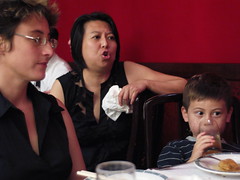Clinical Psychologist
The goal of a clinical psychologist is to reduce mental distress for his or her patient. Clinical psychologists often work in teams with other kinds of professionals, such as psychiatrists, occupational therapists, and social worker to address complex patient problems from different perspectives. Clinical psychology may be confused with psychiatry, which generally has similar goals (e.g. reducing mental distress). The difference is that psychiatrists are physicians with medical degrees. They tend to focus on medication-based solutions, although some also provide psychotherapeutic services as well.
Clinical psychologists require intensive training beyond their university degree in psychology. They need to complete a Master’s or PhD graduate level of training under rigorous supervision.
They can offer a range of professional services, including:
- Administering and interpreting psychological assessment and testing;
- Conducting psychological research;
- Consultation (especially with schools and businesses);
- Development of prevention and treatment programs;
- Program administration;
- Providing expert testimony (forensic psychology);
- Providing psychological treatment (psychotherapy);
- Teaching.
In practice, clinical psychologists may work with individuals, couples, families, or groups in a variety of settings, including private practices, hospitals, mental health organizations, schools, businesses, and non-profit agencies.
Counseling Psychologist
Counseling psychology is a specific kind of psychologist who researches and/or works in several broad domains. These domains are: counseling process and outcome; supervision and training; career development and counseling; and prevention and health. What most counseling psychologists have in common are the way they focus on the person’s positive aspects, that is, their assets and strengths. These professionals support the person’s interaction with their family members and community at large. This is known as “person-environment interactions.” Another focus of their work is on looking at options for educational and career development. Their work is based on sessions for a limited amount of time, or “brief interactions,” with individuals, couples or group. In contrast to psychiatrists, they do not work with patients suffering from medical-based conditions, known as “pathologies;” they focus instead on “intact personalities,” that is, supporting a person to solve certain problems that are related to specific situation, like the loss of a loved one, a job transition, and others. In Canada, a specialized graduate program accredited by the Canadian Psychological Association is required to become a licensed counseling psychologist. Counselling psychologists may be involved in counseling individuals (children, youth and adults), couples, or groups, as well research and teaching.
Psychologists who work on inter-professional teams and conduct psycho-educational assessments pre-kindergarten. e.g Hearing Loss team at Sunny Hill Health Centre for children which includes a developmental pediatrician, clinical psychologist, nurse clinician, speech & language pathologist, occupational therapist & physiotherapist. Some or all of these professionals may be involved in the assessment of children with multiple diagnoses.
Deaf/Blind Specialist/Consultant
Children who are deaf/blind are considered to have a dual sensory loss and has specific diagnostic and support needs that are different from a child who is either deaf or blind. This child requires the support of a specialist referred to as deaf/blind consultant (Fig. 1) and day-to-day support is offered through an intervention.

Figure 1. Deaf/blind specialist
The deaf/blind consultant meets with families, introduces them to the world of deaf/blindness and establishes communication methods and intervention techniques including cues, routines and motivation to use with their deaf/blind child. He or she is also available to attend medical or other agency meetings as required and requested by the family to offer support and expertise.
Deaf and Hard of Hearing Consultant (Teachers of the Deaf or Hard of Hearing-TDHH)
In BC we have several programs that offer the services of teachers of the deaf or hard of hearing (TDHH). When your child is first diagnosed with hearing loss or is deaf, you will have a support team. If your child is diagnosed as deaf or hard of hearing through the hospital or at birth, you can access the services of BCEHP – British Columbia Early Hearing Program. This program can link you with professionals as well as parent support. Communication for an infant or child who is deaf or hard of hearing can take place using many strategies such as sign language, cued speech or speech.
Depending on your child’s specific needs and your family’s needs, you can explore several options for communication choices.
When working with the deaf and hard of hearing consultant or TDHH, you will be introduced to many new terms that are related to the ear, the hearing system and to the technology that will help you.
Click here for a glossary of terms that will assist you in understanding what do each one of these terms means.
The TDHH will provide information on stimulating early communication and how to monitor your baby’s communication progress using assessments and individualized family service plans (IFSP). The TDHH teaches you ways to encourage your baby’s communication development during play and home routines.
Certified Auditory-Verbal Therapists (AVT):
The auditory verbal therapist or AVT (see full Glossary) has been trained to provide services that promote spoken language development for babies and children with hearing loss. He or she can teach you ways to encourage communication development during play and home routines. These therapists work with teachers of the deaf and hard of hearing in the child’s home or at the centre in which the child receives services. If a family lives in a rural or remote area, the AVT will provide visits and support using distance learning technology such as webcams or videoconferencing.


